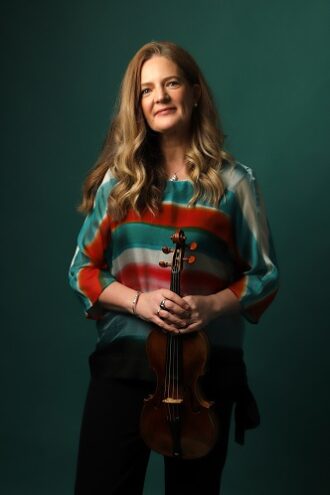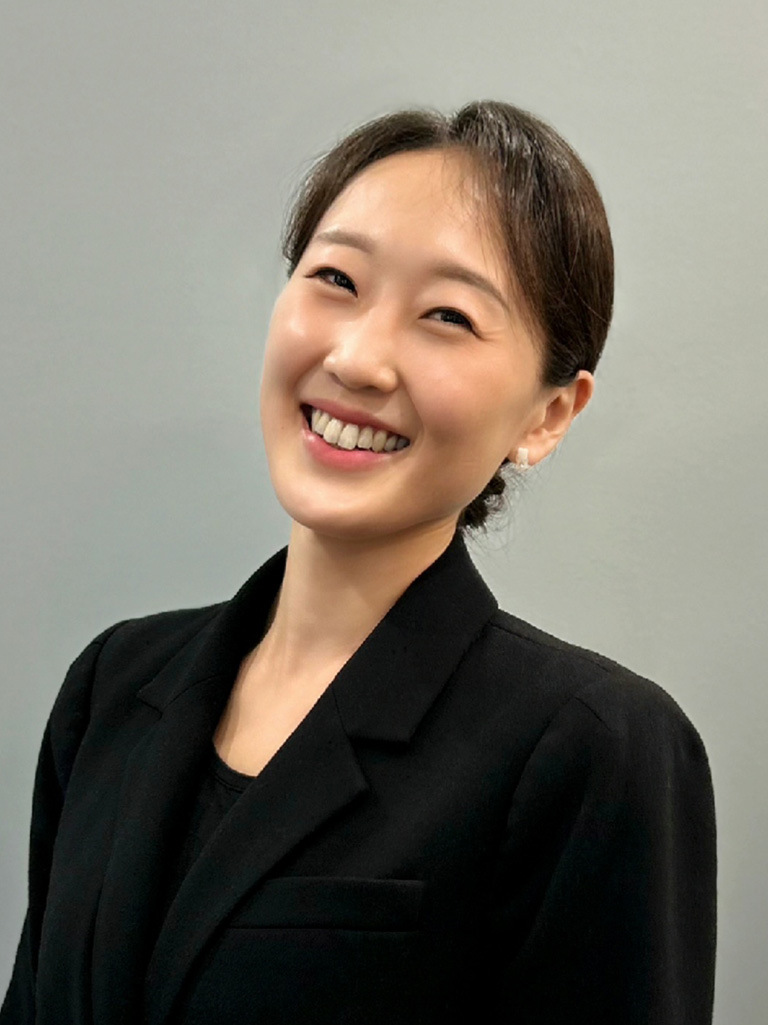Tafelmusik Baroque Orchestra
Principal Guest Director & violin soloist, Rachel Podger
Performances:
January 31–February 2, 2025 at Jeanne Lamon Hall, Trinity-St. Paul’s Centre
Program
George Frideric Handel
1685–1759
Concerto grosso in G Major, op. 3, no. 3
Largo e staccato / Allegro – Adagio – Allegro
Johann Sebastian Bach
1685–1750
Concerto for violin in A Minor, BWV 1041
Allegro – Andante – Allegro assai
Rachel Podger, violin soloist
Henry Purcell
1659–1695
Suite of Ayres for the Theatre
Prelude – Hornpipe – Air – Rondeau
Fantasia in 3 parts upon a Ground
Prelude – Song Tune – Hornpipe – Air – Song Tune –
Passacaglia – Chaconne (Lully)
INTERMISSION
Suljanggu Dance 설장구춤
Jihanna (Jihyun) Back, traditional Korean drum dancer
Antonín Reichenauer
c.1694–1730
Suite in B-flat Major
Ouverture – Adagio – Allegro
Charles Avison
1709–1770
Concerto no. 6 in D Major, after Scarlatti
Largo – Con furia – Adagio – Vivacemente
J.S. Bach
Sinfonia to Cantata 42
Junghyun Kim
born 1998
Maeari-Rang 메아리랑

Rachel Podger
Principal Guest Director & violin soloist
Principal Guest Director Rachel Podger, “the unsurpassed British glory of the baroque violin” (The Times), has established herself as a leading interpreter of baroque and classical music. She was the first woman to be awarded the prestigious Royal Academy of Music/Kohn Foundation Bach Prize in October 2015, Gramophone Artist of the Year 2018, and the Ambassador for REMA’s Early Music Day 2020. A creative programmer, Rachel is the founder and Artistic Director of Brecon Baroque Festival and her ensemble Brecon Baroque, is Patron for The Continuo Foundation, and an Ambassador for the Learned Society of Wales. Rachel was awarded BBC Music Magazine Recording of the Year and Instrumental Award 2023 for her solo album Tutta Sola.
Recent album releases include The Muses Restor’d with Brecon Baroque and Haydn Symphonies 43 and 49 with Tafelmusik, described as ”sensational” (Early Music America). Upcoming releases include The Best of Biber 1681 Sonatas and a new recording of Bach’s sonatas and partitas for solo violin. A dedicated educator, she holds the Micaela Comberti Chair for Baroque Violin at the Royal Academy of Music, and the Jane Hodge Foundation International Chair in Baroque Violin at the Royal Welsh College of Music and Drama. Rachel also has a regular relationship with The Juilliard School in New York.

Jihanna (Jihyun) Back
Traditional Korean drum dancer
Jihanna (Jihyun) Back is a professional Korean traditional dancer who began her career in 2002 with the renowned Little Angels Children’s Art Troupe. She received extensive training at Korea’s leading arts schools and performed as a member of the prestigious Uijeongbu Municipal Dance Company. Since moving to Toronto in 2020, JIhanna has dedicated herself to promoting Korean culture through performances and teaching. As an artist, she actively collaborates with diverse artists and institutions to foster cultural exchange and elevate the global presence of Korean traditional arts.
Tafelmusik Baroque Orchestra
Violin 1
Rachel Podger, Patricia Ahern, Johanna Novom, Julia Wedman
Violin 2
Cristina Zacharias, Geneviève Gilardeau, Christopher Verrette
Viola
Brandon Chui, Patrick G. Jordan
Violoncello
Michael Unterman, Keiran Campbell
Double bass
Shanti Nachtergaele
Oboe
Marco Cera, Yongcheon Shin
Bassoon
Dominic Teresi
Harpsichord
Charlotte Nediger
Access full bios for core orchestra members at tafelmusik.org/orchestra
Program Notes
by Charlotte Nediger
As noted by oboist Marco Cera in his Welcome note for this concert, touring holds a special place in the life of the orchestra. We travel as cultural ambassadors, and are proud to represent Toronto, Ontario, and Canada on the world stage. Our music-making is enriched by the experience of sharing our passion within the context of other places and cultures. As we bring selections from our recent Korean tour program back home, the cultural exchange comes full circle as we share our experience with you.
In fact, the concert hall is a natural home for a meeting of cultures, across borders and centuries, and this week’s program was conceived with this is in mind. Principal Guest Director Rachel Podger brings delights from her native Britain by Handel, Purcell, and Avison. Purcell shakes hands with Lully in France, and Avison with Scarlatti in Spain. Bach inspires us with music that transcends time, and we meet a newcomer to our repertoire, the Czech composer Antonín Reichenauer. We end the concert with a gift from Korea, an arrangement of a traditional Korean song written for the tour by a young composer from Seoul.
Handel Concerto grosso op. 3
Handel’s concerti grossi have been at the heart of Tafelmusik’s repertoire for over four decades. The Opus 3 collection of six concertos was published in London in 1734, and features various combinations of winds and strings. The third concerto includes solo passages for an oboe, bassoon, and violin. All six concertos are confident and spirited works, a perfect welcome to our musical journey.
Bach Violin Concerto in A Minor / Sinfonia to Cantata 42
The violin was one of Bach’s favoured solo instruments: he turned to the violin as a counterpart to the solo voice in countless arias in his sacred works, and composed a remarkable set of sonatas and partitas for unaccompanied violin, works that remain at the very core of the violin repertoire three centuries later. Although primarily a keyboard player, Bach was also a capable violinist and violist, and he understood fully that the violin could be played on the one hand with great energy and virtuosity, and on the other with the most sublime and tender expression. This is witnessed in the contrasting movements of his two concertos for solo violin, which have long been favourites of violinists and audiences alike.
We revisit Bach later in the program with his Sinfonia to Cantata 42. In this work it is a trio of wind players—two oboists and a bassoonist—to whom he turns as soloists. It is a joyful work, written for the first Sunday after Easter in 1725, and thought by some to have been “borrowed” by Bach from a secular birthday cantata (now lost) he wrote for his employer, Prince Anhalt-Cöthen, in 1718. Others have suggested it was the opening movement of a lost concerto in the style of the famous Brandenburgs. In any case, it is Bach in a very good mood!
Purcell Suite of Ayres for the Theatre
Rachel Podger has assembled a suite for us of some of her favourite moments of Purcell. Purcell wrote copious amounts of music for the theatre, and Rachel frames her suite with selections he wrote for productions of Fairy Queen (an anonymous adaptation of Shakespeare’s A Midsummer Night’s Dream) and John Dryden’s King Arthur, both performed at the Queen’s Theatre, Dorset Garden.
We leave the theatre pit in the middle of the suite to play the Fantasia for Three Parts on a Ground. Scored for three violins and continuo, it is one of Purcell’s earliest instrumental pieces, written when he was not yet 20 years old. Its youthful exuberance belies the cleverness with which it is written: the fantasia contains several remarkable passages in canon, including one where a row of notes in the first violin is simultaneously played inverted (i.e. upside down) by the second violin, and backwards by the third. If you like musical puzzles, you can challenge yourself to follow the counterpoint—but all of that is incidental to the pleasure of simply being swept away by this wonderfully uplifting work.
To end the suite, Rachel adds a French “bonbon”: a short chaconne written by Jean-Baptiste Lully for Molière’s Le bourgeois gentilhomme. Many French musicians worked in the London theatres after the Restoration, greatly influencing the style of Purcell and others. They would surely have smiled at the inclusion of this small taste of home.
Reichenauer Suite
The Bohemian education system included musical training for one and all, and thus produced a remarkable number of skilled musicians. Countless of these musicians left home to seek employment abroad in the 18th century, and Tafelmusik has played works by Zelenka, Stamitz, Benda, and other Bohemians whose works we know largely because of their connection to German courts. The composer Antonín Reichenauer chose to remain in his native Prague, and we know little of his life. His music, however, has survived not only in Czech archives, but also in libraries in Silesia, Saxony, and Hesse, suggesting that travelling Bohemian musicians took copies to be performed beyond the Czech border. Reichenauer’s music is new to Tafelmusik, and we look forward to exploring more.
Avison Concerto
Charles Avison was an organist, concert promoter, and composer based in Newcastle, England, and published several volumes of instrumental concertos and sonatas. Arguably his best work is found in his 1744 publication of Twelve Concertos based on harpsichord sonatas by Domenico Scarlatti. Originally from Naples, Scarlatti settled in Lisbon and Madrid, writing some 500 harpsichord sonatas for Infanta Barbara of Portugal and later Queen of Spain. A selection of these sonatas was published in England in 1739 and enjoyed great popularity. Avison’s transcriptions for string orchestra (each concerto is made up of four sonatas) were as popular as the original sonatas. They are charming works, a winning combination of Scarlatti’s flamboyance and Avison’s practical skill.
Kim Maeari-Rang
Finally, we share a gift given to us in Korea. Eagon Industries invites musicians from outside Korea each year to perform a series of concerts in various cities, to which the public are given free tickets. The concerts are so popular that the lucky attendees are chosen by lottery. In conjunction with the concerts, Eagon holds a competition for young composers to create an arrangement of Korea’s unofficial anthem, Arirang, a centuries-old folk song that has become the “voice of the people,” representing the nation and unity. As explained by Eagon, “it is a vehicle for cultural exchange, where foreign musicians perform music containing the unique emotions of our people. At the same time, it is an opportunity to introduce the works of little-known and promising Korean composers through performances by world-class performers.”
Tafelmusik was honoured to be the invited guests for this season’s Eagon concert tour, and to premiere the arrangement of Arirang by the competition winner, Junghyun Kim. Of his arrangement, Junghyun writes, “It is a story of people who go through tunnels of emotions—with messiness, sadness, and a little excitement and humour—to reach the light at the end. The piece starts quite slow and dark, but ends with sparkling brightness, the wishes of people that a more hopeful future will echo (Maeari) while singing Arirang.” It is our great privilege to bring Junghyun Kim’s wonderful arrangement and its message of hope back to Toronto.
